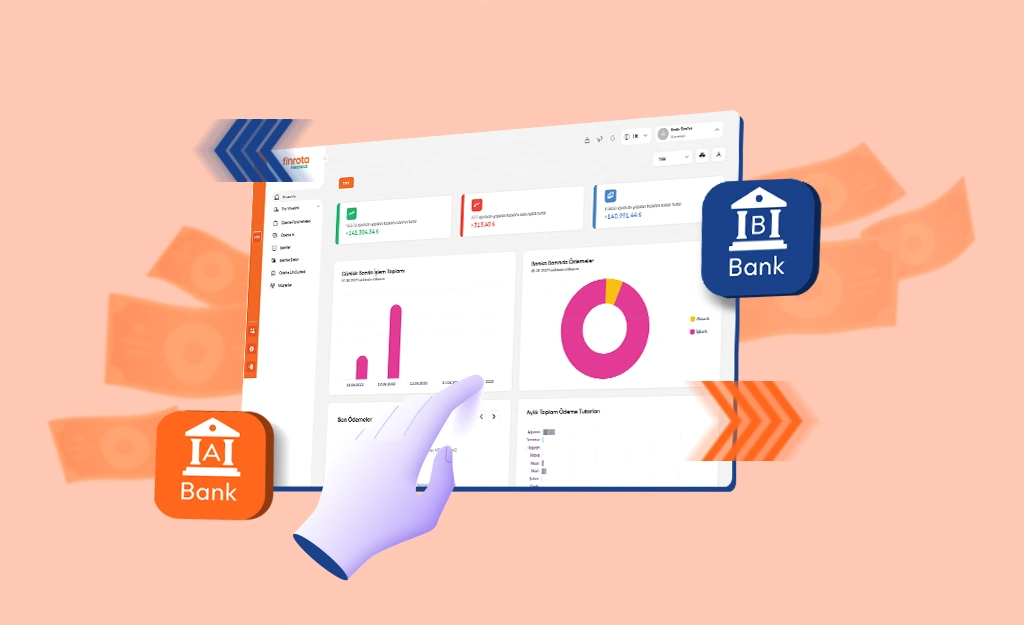Collection processes are crucial for businesses to maintain cash flow and protect their financial health. However, these processes are fraught with risks, and an effective risk management strategy is vital for preventing financial losses and optimizing cash flow. In this article, we will examine the importance of risk management in collections and how Finrota's NAP360 platform contributes to these processes in detail.
Common Risks in Collections
Collection processes are a critical component that directly impacts a business's financial health. However, these processes face various risks, and managing these risks effectively is crucial for maintaining financial stability. Here are common risks encountered in collections and their effects on businesses:
Payment Delays and Bankruptcy Risk
Payment Delays:
When customers fail to make payments on time, it negatively affects the business's cash flow. Payment delays can lead to liquidity issues, especially for small and medium-sized enterprises.
Bankruptcy Risk:
Customer bankruptcies can result in uncollectible debts and bad receivables. This situation can severely impact the financial health of the business.
Bad Debts and Uncollectible Receivables
Bad Debts:
Uncollectible debts appear as bad receivables on the business's balance sheet and can reduce financial performance. Bad debts can affect the company's profit margins and complicate cash flow.
Uncollectible Receivables:
Receivables that cannot be collected from customers lead to direct financial losses and can affect operational efficiency.
Fraud and Forgery
Fraud Risk:
Fraud risks in the collection processes can lead to financial losses for businesses. Combating fraud is crucial for ensuring financial security.
Forgery Risk:
Fake payment information or fraudulent customers can negatively impact collection processes and lead to security vulnerabilities.
Insufficient Customer Information
Incomplete Customer Information:
Missing or incorrect information about customers can reduce the efficiency of collection processes. Incorrect information can lead to increased payment errors and delays.
Information Updates:
Failing to regularly update customer information can lead to challenges and risks in collection processes.
Internal Process Errors
Faulty Processes:
Errors in internal processes can prevent collections from being conducted accurately and on time. This situation can reduce efficiency and increase financial risks.
Inadequate Audits:
Lack of internal audits can make it difficult to detect process errors, which can increase risks.
Risk Management Strategies
To minimize risks and make collection processes more efficient, various strategies and tools are available. Here are detailed explanations of risk management strategies in collections:
Comprehensive Customer Analysis and Credit Risk Assessment
Customer Analysis:
Definition:
The process of evaluating customers' financial status, payment histories, and credit capacities.
Effects:
Comprehensive customer analysis helps identify potential risks in advance and tailor collection strategies accordingly. This can reduce bad debt risks and minimize financial losses.
Implementation:
Customer credit reports, financial statements, and payment histories are reviewed. Additionally, the industry and market conditions of customers are assessed.
Credit Risk Assessment:
Definition:
An evaluation to determine the credit risk of a customer.
Effects:
Credit risk assessment allows for more informed credit decisions by identifying customers' payment capacities and risk levels.
Implementation:
Credit risk assessment is based on factors such as customer history, payment habits, and financial stability. Risk scores and limits are also established.
Effective Collection Processes and Automation
Automation:
Definition:
The process of automating collection processes and reducing manual tasks.
Effects:
Automation speeds up processes, reduces error rates, and increases efficiency. It also makes the collection process more consistent and traceable.
Implementation:
Tools such as automatic invoicing, payment reminders, and tracking systems are used. Automated payment plans and reminders can also be implemented.
Effective Process Management:
Definition:
Regular monitoring and improvement of collection processes.
Effects:
Effective process management enhances the efficiency of collection operations and reduces risks. It also identifies weak points in processes for improvement.
Implementation:
Regular review of processes, performance analyses, and improvement recommendations are conducted.
Fraud and Forgery Prevention Measures
Security Measures:
Definition:
Measures taken to reduce fraud and forgery risks in collection processes.
Effects:
Security measures ensure the accuracy and security of transactions, reduce fraud risks, and prevent financial losses.
Implementation:
Security software, identity verification systems, and fraud detection tools are utilized. Security protocols and encryption techniques are also applied.
Training and Awareness:
Definition:
Training employees about fraud and forgery.
Effects:
Training and awareness help employees recognize fraud risks and be more vigilant against them.
Implementation:
Training programs and awareness campaigns are organized. Employees are taught about fraud techniques and detection methods.
Customer Communication and Persuasion Strategies
Communication Strategies:
Definition:
Methods for maintaining regular and effective communication with customers.
Effects:
Communication strategies improve collection processes, make payment reminders effective, and enhance customer satisfaction.
Implementation:
Regular payment reminders, personal communication, and customer feedback are used. Payment plans and flexible solutions are also offered.
Persuasion Strategies:
Definition:
Methods to encourage customers to make payments.
Effects:
Persuasion strategies increase collection rates and reduce payment delays.
Implementation:
Persuasive offers, payment discounts, and incentives are provided. Additionally, targeted persuasion strategies are developed using customer relationship management (CRM) systems.
Risk Management with Finrota’s NAP360
Finrota’s NAP360 platform offers a range of features supporting the above risk management strategies:
Real-Time Data Analysis:
Instant evaluation of customer risk profiles and analysis of financial conditions.
Automated Collection Processes:
Automation of collection processes, reducing errors and speeding up transactions.
Advanced Security Features:
Security measures to reduce fraud and forgery risks.
Comprehensive Customer Information Management:
Centralized collection and updating of customer information, enhancing the efficiency of collection processes.
Risk management in collections is a critical process for maintaining financial health and optimizing cash flow. Finrota's NAP360 platform provides comprehensive solutions to make these processes more effective and efficient. For businesses looking to minimize risks, optimize collection processes, and protect financial health, Finrota’s tools and strategies offer significant advantages.



